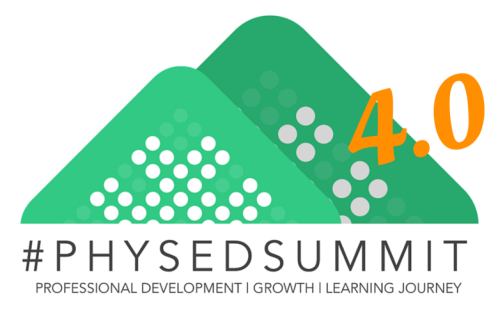PHYSEDagogy
#PhysEdSummit 4.0The TGfU SIG executive took part in the #PhysEdSummit 4.0 conducted by the PHYSEDagogy team on the 27th February 2016. The #PhysEdSummit 4.0 focused on models based practice 'instructions models' in PE and the TGfU SIG executive ran four presentations on TGfU as part of the professional development initiative.
The PHSYEDagogy Team's mission is to "provide digital professional learning opportunities for physical education professionals by sharing, discussing, and reflecting on best practices". The #PhysEdSummit is a FREE online conference put on by PE professionals for PE professionals.SIG executives: Kelly Ann Parry, Dr. David Gutiérrez Díaz del Campo, Dr. Heidi Bohler and Dr. Stephen Harvey contributed four TGfU sessions as part of the February: #PhysEdSummit 4.0 Conference Program |
Part One: An Overview of the TGfU Model–Putting the Why Before the HowSpeaker: Kelly Ann Parry
Intended Audience: Physical Education (Grades 3-12) Session Description: This session will provide an overview of how the Teaching Games for Understanding (TGfU) model can be applied to practice with a focus on the four guiding pedagogical principles:
Part Three: Game Modification for Learning Tactical Concepts in Net/Wall GamesSpeakers: Heidi Bohler and Dr. Stephen Harvey
Intended Audience: Physical Education (Grades 3-12) Session Description: This session will provide practitioners with ideas on how to develop the four pedagogical principles of TGfU. In particular, the session will focus on how to set up the learning environment and designing games using these pedagogical principles to “get a good game going.” This session will develop ideas from Part One: An Overview of the TGfU Model, and provide a link to Part Four: Developing Questioning When Teaching Using TGfU. |
Part Two: Game Modification for Learning Tactical Concepts in Invasion GamesSpeaker: David Gutiérrez Díaz del Campo and Kelly Ann Parry
Intended Audience: Physical Education (Grades 3-12) Session Description: This session will provide practitioners with ideas on how to develop the four pedagogical principles of TGfU. In particular, the session will focus on how to set up the learning environment and designing games using these pedagogical principles to “get a good game going.” This session will develop ideas from Part One: An Overview of the TGfU Model, and provide a link to Part Four: Developing Questioning When Teaching Using TGfU. Part Four: Developing QuestioningSpeaker: Dr. Stephen Harvey
Intended Audience: Higher Ed; Physical Education (Grades 3-12) Session Description: Despite the development of a wide body of literature suggesting the efficacy of TGfU to teaching and learning, a range of challenges face teachers and coaches taking up TGfU. Light (2013) suggests that one of the most significant challenges is the effective use of productive and generative questioning. This presentation will offer insight into how practitioners can operationalize the use of questioning through the provision of theoretically grounded practical examples that will assist practitioners in their implementation of TGfU. |
#PhysEdSummit 2016: August 27, 2016
Assessment in Game-Centred Approaches
|
Speaker: Stephen Harvey
Intended Audience: Physical Education (Grades 312); Higher Ed; Future Professionals (PETE) Session Description: This session builds on previous #PhysEdSummit presentations that have focused on game centered approaches to focus on assessment. It will introduce both formative and summative assessments that can be used when teachers use a game centered approach and provide teachers with much needed information on how to assess student learning in gamecentered approaches. |
|








